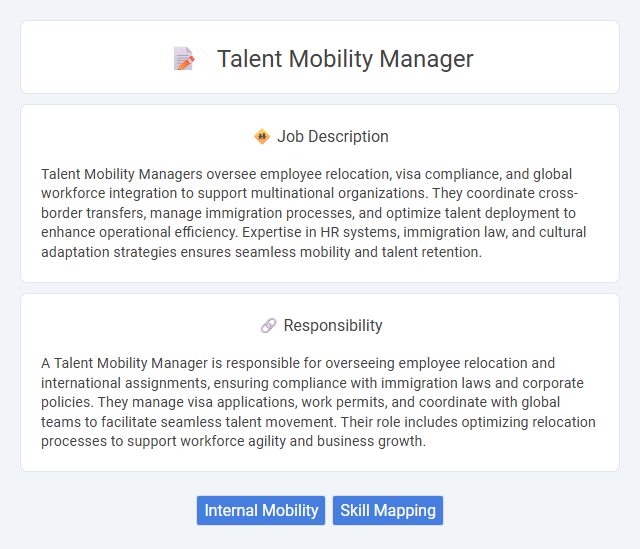
Talent Mobility Managers oversee employee relocation, visa compliance, and global workforce integration to support multinational organizations. They coordinate cross-border transfers, manage immigration processes, and optimize talent deployment to enhance operational efficiency. Expertise in HR systems, immigration law, and cultural adaptation strategies ensures seamless mobility and talent retention.
Candidates with strong interpersonal skills and adaptability are more likely to thrive as a Talent Mobility Manager. Individuals who demonstrate effective communication and problem-solving abilities tend to be suitable for managing employee transitions across locations. Those lacking empathy or organizational skills might find this role challenging to perform successfully.
Qualification
Talent Mobility Managers typically require a bachelor's degree in Human Resources, Business Administration, or a related field, with many employers preferring candidates who hold advanced certifications such as Certified Global Mobility Specialist (CGMS). Strong knowledge of international labor laws, immigration regulations, and cross-cultural management is essential for effective workforce relocation and compliance. Proven experience in project management, data analysis, and strategic planning enhances a candidate's ability to optimize global talent deployment and support organizational growth.
Responsibility
A Talent Mobility Manager is responsible for overseeing employee relocation and international assignments, ensuring compliance with immigration laws and corporate policies. They manage visa applications, work permits, and coordinate with global teams to facilitate seamless talent movement. Their role includes optimizing relocation processes to support workforce agility and business growth.
Benefit
Talent Mobility Managers likely enhance organizational agility by streamlining employee relocation and career development processes, potentially increasing retention and job satisfaction. They probably optimize talent distribution across global sites, improving operational efficiency and fostering a diverse, adaptable workforce. This role may also reduce relocation costs and compliance risks through strategic planning and policy implementation.
Challenge
Talent Mobility Manager roles likely involve navigating complex global workforce challenges, including managing employee relocations and compliance with international regulations. The position may require balancing the demands of diverse cultural expectations while ensuring operational efficiency. Addressing these challenges probably demands strategic planning and strong organizational skills.
Career Advancement
Talent Mobility Managers drive strategic workforce planning by facilitating internal employee transfers and international assignments that align with career advancement goals. They optimize talent acquisition pipelines through mobility programs, enabling professionals to gain diversified experience and accelerate leadership development. Expertise in managing visa compliance, relocation logistics, and cultural integration enhances employee satisfaction and retention, fostering long-term organizational growth.
Key Terms
Internal Mobility
Talent Mobility Managers specialize in optimizing internal mobility to enhance employee career growth and retention within an organization. They develop strategic programs that identify high-potential employees and facilitate seamless transfers across departments or roles, improving workforce agility. By leveraging data analytics and talent mapping, these managers ensure alignment between organizational needs and employee aspirations, fostering a dynamic, engaged workforce.
Skill Mapping
Talent Mobility Managers utilize skill mapping to identify employees' strengths and gaps, enabling strategic workforce planning and internal mobility. This process involves analyzing individual competencies against organizational needs to match talent with appropriate roles, enhancing employee development and retention. Accurate skill mapping supports agile talent deployment, ensuring the right skills are available to meet evolving business demands.
 kuljobs.com
kuljobs.com